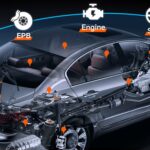This article delves into the accuracy of using OBD2 scanners for measuring vehicle acceleration, specifically 0-60 mph times. We compare an OBD2-based solution using the Car Scanner app against a Racelogic Performance Box, a gold standard in GPS-based performance measurement. This detailed comparison explores whether a budget-friendly OBD2 setup can rival dedicated performance timers.
Testing Methodology for Acceleration OBD2 Measurement
To assess the accuracy of Acceleration Obd2 readings, we conducted four test runs. Each run included two 20 km/h speed segments, resulting in eight timed segments. Both the Car Scanner app and the Racelogic Performance Box recorded times simultaneously for each run. The Racelogic Performance Box, with its proven accuracy, served as the benchmark for comparison. We evaluated the OBD2 timer’s accuracy based on the deviation from the GPS-based readings.
Results: Acceleration OBD2 Accuracy
The most significant difference between the OBD2 and GPS recorded times across all eight segments was 0.17 seconds. A table illustrating the complete results can be found in the accompanying video (link to video). This suggests that the OBD2 timer provides accuracy within 0.2 seconds, assuming the GPS timer’s absolute precision.
Factors Influencing GPS and Acceleration OBD2 Accuracy
While the Racelogic Performance Box is highly accurate, its 10Hz GPS sensor has a potential margin of error up to 0.1 seconds. Theoretically, adjusting for this potential error might place the OBD2 readings even closer to true values, potentially within a tenth of a second. However, this remains speculative without further testing. To maintain a conservative estimate, we conclude that the Car Scanner app delivers acceleration timing accuracy within 0.2 seconds.
Choosing the Right 0-60 Timer: Acceleration OBD2 vs. GPS
For budget-conscious users, the Car Scanner app coupled with an OBD2 adapter presents a compelling option. The total cost of this setup is significantly less than dedicated performance timers like the Dragy or Racelogic Performance Box. This acceleration obd2 solution offers excellent value if a potential 0.2-second variance is acceptable. For those demanding accuracy within a tenth of a second, the Dragy, with its faster GPS engine and user-friendly interface, appears promising. However, its claimed accuracy requires independent verification.
Conclusion: Acceleration OBD2 Offers Affordable Performance Measurement
OBD2-based solutions, such as the Car Scanner app, provide a cost-effective method for measuring vehicle acceleration. While not as precise as high-end GPS timers, the accuracy achieved with acceleration obd2 is sufficient for many applications. The choice between OBD2 and GPS ultimately depends on individual budget and accuracy requirements. For a basic understanding of your car’s performance capabilities, acceleration obd2 offers a compelling balance of cost and functionality.

